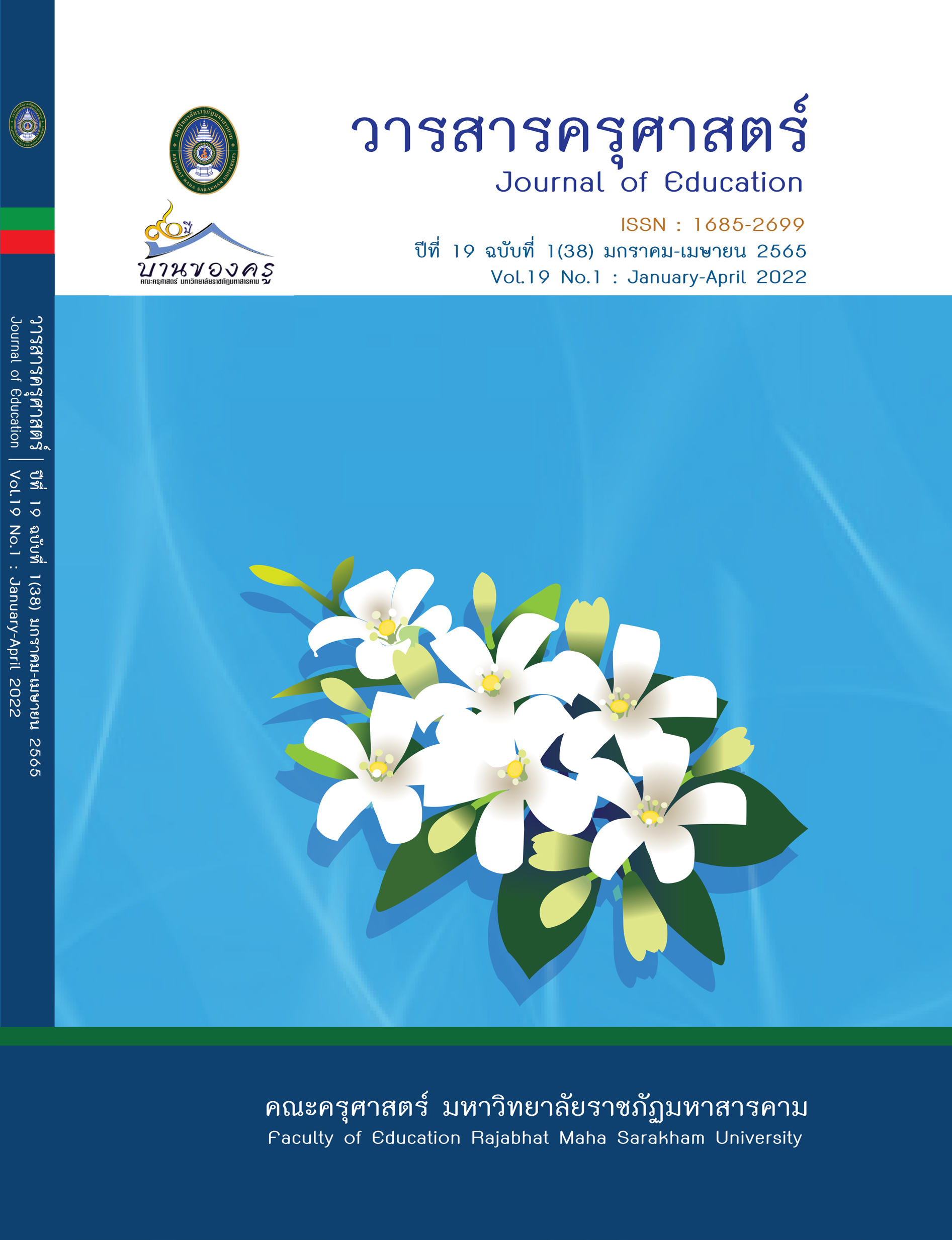Teaching Chinese via/ through Social Media in Thailand
Main Article Content
Abstract
This article seeks to present how social media platforms are used in Chinese language teaching, along with their benefits and limitations. Several social media platforms are being used for teaching Chinese, such as Facebook, Line, and Google Meet. Regarding the benefits, these social media platforms are convenient, user-friendly, and serving various needs of users. Social media facilitate data sharing between learners and instructors online, making the instruction possible from anywhere and at any time. They promote the learning objectives and enhance writing, speaking, reading, and listening skills in Chinese. In addition, social media also develop a positive relationship between learners and instructors. However, there are some drawbacks in using social media for teaching Chinese. For instance, privacy issues should be taken more seriously when sharing data while learning and teaching Chinese. Copyright in the content is another controversial issue when using social media for teaching Chinese. Learners and instructors in some areas also experience poor internet connection. Lastly, learners and instructors alike should use their discretion in choosing the appropriate social media platforms.
Article Details

This work is licensed under a Creative Commons Attribution-NonCommercial-NoDerivatives 4.0 International License.
ข้อกำหนดเบื้องต้นที่ผู้นิพนธ์(ผู้ส่งบทความ) ควรทราบ
1. ผู้นิพนธ์ที่ประสงค์จะลงตีพิมพ์บทความกับวารสาร ตั้งแต่เดือนมกราคม 2563 เป็นต้นไป ให้ใช้รูปแบบใหม่ (Template 2563) โดยสามารถดูตัวอย่างได้ที่เมนู GUIDELINES
2. จะตีพิมพ์และเผยแพร่ได้ ต้องผ่านการประเมินจากผู้ทรงคุณวุฒิ (Peer Review)
3. การประเมินบทความโดยผู้ทรงคุณวุฒิ (Peer Review) เป็นแบบ Double Blind
4. การอ้างอิงบทความใช้หลักเกณฑ์ APA (American Psychological Association) คลิก
5. บทความถูกปฏิเสธการตีพิมพ์ ไม่ผ่านการประเมิน ผู้นิพนธ์ขอยกเลิกเองหรือชำระเงินก่อนได้รับการอนุมัติ ทางวารสารไม่มีนโยบายการคืนเงิน
References
กาญจนา บุญภักดิ์. (2563). การจัดการเรียนรู้ยุค New Normal. วารสารครุศาสตร์อุตสาหกรรม, 19(2), 1-6.
จินตนา วิเศษจินดา และสมพงษ์ จิตระดับ. (2561). แนวทางการจัดการเรียนการสอนภาษาจีนระดับมัธยมศึกษาตอนปลาย. วารสารมหาวิทยาลัยศิลปากร, 11(2), 445-455.
ธนัช นามวัฒน์ และกมลทิพย์ รักเกียรติยศ. (2563). การใช้สื่อเทคโนโลยีสำหรับการสอนภาษาจีนของโรงเรียนในสังกัดกรุงเทพมหานคร. วารสารมนุษยศาสตร์และสังคมศาสตร์ มหาวิทยาลัยมหาสารคาม, 39(2), 19-31.
ธนะวัฒน์ วรรณประภา. (2560). สื่อสังคมออนไลน์กับการศึกษา. วารสารศึกษาศาสตร์ มหาวิทยาลัยมหาสารคาม, 11(1), 7-20.
นฤมล บุญส่ง. (2561). สื่อสังคมกับการเรียนการสอนในศตวรรษที่ 21. วารสารมหาวิทยาลัยศิลปากร, 11(1), 2873-2885.
น้ำทิพย์ วิภาวิน. (2558). เครือข่ายสังคมในสังคมเครือข่าย. วารสารวิจัยสมาคมห้องสมุดแห่งประเทศไทยในพระราชูถัมภ์สมเด็จพระเทพรัตนราชสุดาฯ สยามบรมราชกุมารี, 8(2), 119-127.
ยุพดี หวลอารมณ์, จิดาภา อมรางภูร และวัชราภรณ์ เจริญสะอาด. (2564). การจัดการเรียนการสอนภาษาจีนผ่านแอปพลิเคชันสื่อสังคมออนไลน์เพื่อสร้างแรงจูงใจในการเรียนรู้. วารสารมนุษยศสตร์และสังคมศาสตร์ มหาวิทยาลัยราชภัฏอุดรธานี, 10(1), 37-52.
ระวิ แก้วสุกใส และชัยรัตน์ จุสปาโล. (2558). เครือข่ายสังคมออนไลน์:กรณี เฟสบุ๊ค (Facebook) กับการพัฒนาผู้เรียน. วารสารมหาวิทยาลัยนราธิวาสราชนครินทร์, 1(1), 195-205.
วราพร ดำจับ. (2560). สื่อสังคมออนไลน์กับการเรียนรู้ในศตวรรษที่ 21. วารสารศิลปศาสตร์ มหาวิทยาลัยแม่โจ้, 7(2), 143-159.
วศิน สุขสมบูรณ์วงศ์, มัลลิกา ดวงภักดี และกนิษฐา มาลา. (2564). การใช้แอปพลิเคชันสำหรับการสอนภาษาจีนของครูผู้สอนภาษาจีนในช่วงความปรกติใหม่ กรณีศึกษา โรงเรียนในสังกัดสำนักงานเขตพื้นที่การศึกษามัธยมศึกษา เขต 38 จังหวัดสุโขทัย. Journal of Modern Learning Development, 6(5), 179-193.
สุรศักดิ์ ปาเฮ. (2560). กระบวนทัศน์เทคโนโลยีการศึกษาในยุคดิจิทัล. แพรไทยอุตสาหการพิมพ์.
สำนักวิชาการและมาตรฐานการศึกษา. (2556). ตัวชี้วัดและสาระการเรียนรู้ภาษาจีน กลุ่มสาระการเรียนรู้ภาษาต่างประเทศ. โรงพิมพ์ สกสค. ลาดพร้าว.
หยกขาว สมหวัง. (2562). การพัฒนาทักษะทางภาษาจีนจากประโยชน์ของการใช้เฟซบุ๊กในกลุ่มนักศึกษาสาขาภาษาจีน มหาวิทยาลัยราชภัฏอุดรธานี. วารสารมนุษยศสตร์และสังคมศาสตร์ มหาวิทยาลัยราชภัฏอุดรธานี, 8(2), 157-171.
Raja. T. (2018). Social Media on Education. In Krishna College of Education (Eds). National Conference on Impact of Social Media on Education in the Present Scenario. (pp. 44-48). Tiruchengode Tamilnadu India.
Suresh. K. (2018). Social Media in Education: The Varieties. In Krishna College of Education (Eds). National Conference on Impact of Social Media on Education in the Present Scenario. (pp. 64-68). Tiruchengode Tamilnadu India.
Syamala Devi. K., Gouthami. E., & Vijaya Lakshmi. V. (2019). Role of Social Media in Teaching – Learning Process. Journal of Emerging Technologies and Innovative Research (JETIR), 6(1). 96-103.
Williamson, A. (2013). Social Media Guidelines for Parliaments. Francais: Inter-Parliamentary Union.


